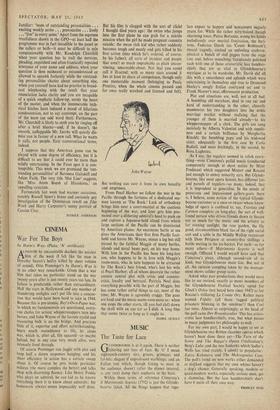MUSIC The Taste for Lace
GLYNDEBOURNE is at it again. There is neither faltering nor loss of face. By 'it' I mean eighteenth-century airs, graces, grimaces and fal-lals; elegant if unprofound warblings; and an Italian text which, though foxing to most in the audience, doesn't (after the dinner interval, at any rate) damp their euphoria in the least.
Within these terms of reference Cimarosa's II Matrimonio Segreto (1792) is just the Glynde- bourne ticket. All the things happen that regu-
lars expect to happen and newcomers vaguely yearn for. While the rather wiry-voiced though charming tenor, Pietro Bottazzo, wrung his hands melodiously over marital frustration, the bari- tone,- Federico Davia (as 'Count Robinson'), mused vaguely, cocked an unfeeling eyebrow, plucked a bunch of real grapes from the stage sine and, before munching, fastidiously polished each with one of those aristocratic lace handker- chiefs that are as vital to Glyndebourne's mystique as to its wardrobe. Mr. Davia did all this with a smoothness and aplomb which were entertaining in themselves and true to Desmond. Heeley's snugly Italian courtyard set and to Frank Hauser's neat, effervescent production.
Plot and situations are, well, not at all bad.' A bumbling old merchant, deaf in one ear and hard of understanding in the other, clumsily manoeuvres his two daughters into the noble marriage market without realising that the younger of them is married already—to his whippersnapper of a clerk. The girls are sung incisively by Alberta Valentini and with supple- ness and a certain brilliance by Margherita. Rinaldi; the bumbling papa and his widowed sister, adequately in the first case by Carlo Badioli, and most fetchingly, in the second, by Rosa Laghezza.
As I say, the regulars seemed to relish every- thing—even Cimarosa's pallid music (conducted competently enough at short notice by Myer Fredman) which suggested Mozart and Rossini just enough to annoy minority ears. But Glyndc- bourne, like most opera houses, has different lots and parcels of regulars—so many, indeed, that it is imprudent to generalise. In the minds of penurious and impassioned gallery-goers there is, I believe, some notion of the typical Glynde- bourne customer as a once-or-twicer whose know- ledge of opera is confined to, say, Traviata and Carmen complete on long-play, the sort of well- found person who drives friends down to Sussex not so much for the music and the artistry as for evening sunlight, the rose garden, the lily pond, circumambient black ties of the right social sort and a table in the Middle Wallop restaurant with Dom Perignon at seventy-five shillings a bottle waiting in the ice-bucket. For such—as for many others—// Matrintonio Segreto is well enough. Offhand I would myself have said that Cimarosa's piece, although second-rate of its kind, was Glyndebourne main line. But not at all. An opinion sampling taken by the manage- ment shows solider group tastes.
Asked what past productions they would most like to see revived, exactly as many members of the Glyndebourne Festival Society opted for Gluck's Orfeo (not heard here since 1947) as for Rossini's titillating Le Comte Ory. Rather more wanted Fiddio (all those ragged political prisoners blinking in the sunshine!) than Cos) fan tutte. Almost as surprisingly, at the head of the poll came Der Rosenkavalier. This has aristo- cratic lace handkerchiefs, true, but what passes in many judgments for philosophy as well.
For my own part, I would be happy to see at Glyndebourne two Britten chamber operas which haven't been done there yet—The Turn of the Screw and The Beggar's Opera ('realisation'); Berg's Lulu; and the two Janaceks which Sadler's Wells has tried (vainly, I admit) to popularise: Katya Kabanova and The Makropoulos Case. The poll's trend on new works either demanded or disliked suggests that my own whims haven't .t dog's chance. Generally speaking, modern or quasi-modern works, especially serious ones, get a slamming. But the lace handkerchiefs don't have it quite all their own way.
CHARLES RCID






























 Previous page
Previous page